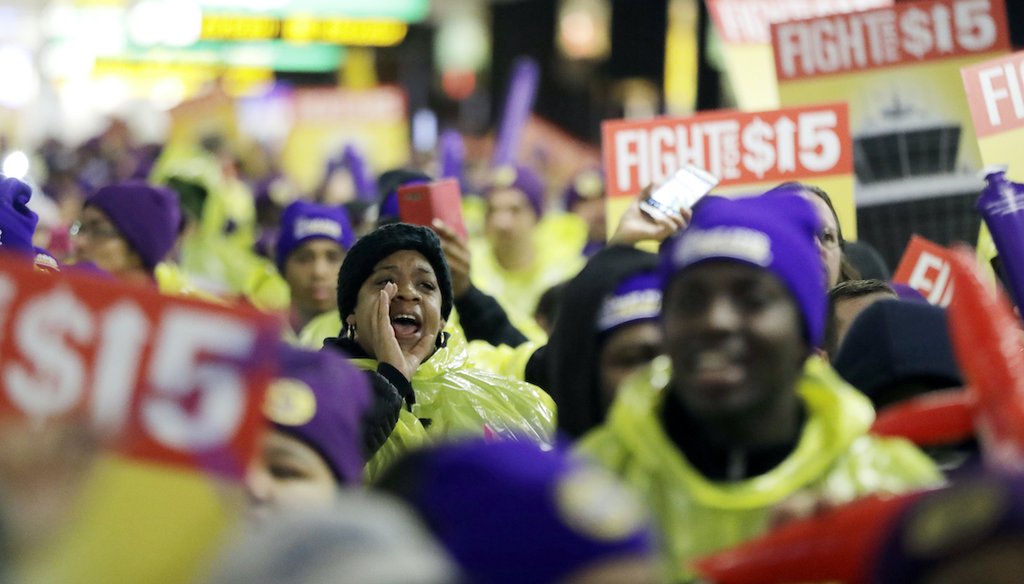Get PolitiFact in your inbox.

A woman shouts while marching with service workers asking for $15 minimum wage pay during a rally at Newark Liberty International Airport, Tuesday, Nov. 29, 2016, in Newark, N.J. The event was part of the National Day of Action to Fight for $15. (AP)
Fact-checking Joe Biden’s claim about $15 minimum wage and poverty
If Your Time is short
-
President Biden proposed lifting the federal minimum wage from $7.25 to $15 as part of his $1.9 trillion American Rescue Plan, but it may not make the final version of the legislation.
-
Experts on wages say that in addition to hourly wages, other factors affect whether a household lives in poverty, including expenses for child care and housing.
-
A household of four people with one wage earner at $13 an hour is living below the federal government’s poverty guideline.
President Joe Biden’s proposal for a $15-an-hour minimum wage as part of his $1.9 trillion American Rescue Plan may not survive amid resistance in Congress, but Biden sees his campaign promise as a key path out of poverty.
"No one should work 40 hours a week and live below the poverty wage," he told CBS’ Norah O’Donnell in an interview that aired Super Bowl weekend. "And if you're making less than $15 an hour, you're living below the poverty wage."
We found that whether a person earning below $15 an hour is living in poverty depends upon various factors, including the size of their household and the cost of living in their jurisdiction.
Federal minimum wage has been stagnant for more than a decade
Since 2009, the federal minimum wage has been $7.25 an hour, though 29 states and Washington D.C. have higher minimum wages, as do some cities and counties.
Among the general public, the $15 minimum wage is popular, although business groups and their allies among lawmakers argue that they would cause job losses. Economists who study wage hikes debate the impact on employment or the economy. The nonpartisan Congressional Budget Office concluded in February that raising the federal minimum wage in annual increments to $15 per hour by June 2025 would reduce employment by 1.4 million workers but also reduce the number of people in poverty by 900,000.
Measured in inflation-adjusted dollars, the current minimum wage is lower than it was from the mid-1950s to late 1980s, and in many years since then.
Wages aren’t the only factor in poverty
Since Biden didn’t explain during the interview whether he was referring to full-time workers of a certain household size, we asked his spokesperson to clarify what he meant. T.J. Ducklo pointed to the federal government’s poverty guidelines that show a family of four earning $26,500 as living in poverty. Based on a calculation of 2,000 hours at a full-time hourly job, that means the wage earner in a family of four earning up to $13 an hour is living in poverty. If the same worker earned $15 an hour, the family would earn $30,000 a year, placing them over the poverty line.
Experts on wages didn’t dispute Biden’s math, but said his comment doesn’t fully reflect the factors that determine if someone lives in poverty. One key factor is varying housing costs depending on geographic location.
Shawn Fremstad, a senior fellow at the Center for Economic and Policy Research, said the federal poverty guidelines are updated based on inflation, but are otherwise outdated and based on an understanding developed decades ago of the amount of income needed to live out of poverty.
"The antiquated HHS poverty standard used by the White House includes ZERO allowance for child care, health insurance, prepared foods, meals away from home, modern transportation, and other goods and services that weren’t thought of as necessities in the late 1950s and early 1960s, when a full-time housewife was assumed and mainstream living standards were very different," Fremstad said.
Experts said that wages alone may not shed light on whether a household lives in poverty.
For example, a family with two full-time workers each earning $13 an hour would be above the poverty-level, but if they need child care for two children, it would wipe out more than half their income, said Elizabeth Pancotti, policy adviser at Employ America, a group that supports a $15 minimum wage.
"As a result, it’s likely unrealistic to think that all families of four earning minimum wage-level earnings could have both adults work," she said. "I think it’s reasonable for the White House to base their analysis on one income for a household of four."
David Neumark, a professor of economics at the University of California-Irvine, who has found negative impacts on jobs from wage hikes, said the minimum wage is a "crude tool to target poverty" because it targets low wages, not low family income.
"A worker gets the higher minimum wage whether she is a single mother (who needs help!), the spouse of someone who makes $1 million a year, or the teenage daughter of that same person," he said.
The calculation by Biden also ignores other government programs, most notably the earned income tax credit, which provides a subsidy to low-wage workers. A family earning low wages may also get food stamps, subsidized housing or Medicaid.
Our ruling
Biden said, "If you're making less than $15 an hour, you're living below the poverty wage."
A spokesman for Biden said he was referring to a family of four with one full-time income using the federal government’s poverty guideline, an explanation Biden didn’t include in the interview. Using that measurement, that family with a paycheck of $13 an hour would live below the poverty line. At $15 an hour, the same family would clearly be above the poverty line. So Biden was off by about a dollar, using the existing standards.
But experts said wages alone don’t tell the full story about whether a household lives in poverty. Other factors include child care and housing costs, for example, which can vary by geography. Generalizing a "poverty wage" to a specific number ignores the different circumstances that families face. Other experts said the federal definition of a poverty level is out of date and needs changing.
We rate this claim Half True.
RELATED: Minimum wage increases and the myth of the $38 burrito
RELATED: Bobby Scott is right about falling value of minimum wage
Our Sources
Factba.se, Interview: Norah O'Donnell Interviews Joe Biden at The White House, Feb. 5, 2021
U.S. Department of Labor, Minimum wage
U.S. Department of Health and Human Services, U.S. Federal Poverty Guidelines, Jan. 26, 2021
USA Today, Biden says minimum wage increase probably not 'going to survive' as part of COVID-19 relief package, Feb. 6, 2021
Washington Post, CBO report finds $15 minimum wage would cost jobs but lower poverty levels, Feb. 8, 2021
Joe Biden transition, "President-elect Biden Announces American Rescue Plan," January 2021
National Conference of State Legislatures, State Minimum Wages, Jan. 8, 2021
National Bureau of Economic Research working paper by David Neumark and Peter Shirley, Myth or measurement: what does the new minimum wage research say about minimum wages and job loss in the United States? January 2021
Congressional Budget Office, The Budgetary Effects of the Raise the Wage Act of 2021, February 2021
Washington Post The Fact Checker, Biden’s claim that with a $15 minimum wage, ‘the whole economy rises’ Feb. 9, 2021
Economic Policy Institute, Raising the federal minimum wage to $15 by 2025 would lift wages for over 33 million workers, July 17, 2019
Center for Economic and Policy Research, The Defining Down of Economic Deprivation: Why We Need to Reset the Poverty Line, Sept. 30, 2020
PolitiFact, "Fact-checking a $15 minimum wage," May 9, 2016
PolitiFact, "What's in Joe Biden's $1.9 trillion American Rescue Plan?" Jan. 15, 2021
PolitiFact, Biden includes $15-an-hour minimum wage in his economic and coronavirus relief proposal, Jan. 21, 2021
Email interview, T.J. Ducklo, President Joe Biden spokesperson, Feb. 9, 2021
Email interview, Timothy M. (Tim) Smeeding, professor of public affairs and economics, University of Wisconsin-Madison, Feb. 9, 2021
Email interview, Shawn Fremstad, Senior Fellow, Center for Economic and Policy Research, Feb. 9, 2021
Email interview, Arindrajit Dube, associate professor of economics, University of Massachusetts Amherst, Feb. 9, 2021
Email interview, Elizabeth Pancotti, policy advisor at Employ America, Feb. 9, 2021
Email interview, David Neumark, a professor of economics at the University of California-Irvine, Feb. 9, 2021
Browse the Truth-O-Meter
More by Amy Sherman
Fact-checking Joe Biden’s claim about $15 minimum wage and poverty
Support independent fact-checking.
Become a member!
In a world of wild talk and fake news, help us stand up for the facts.






































